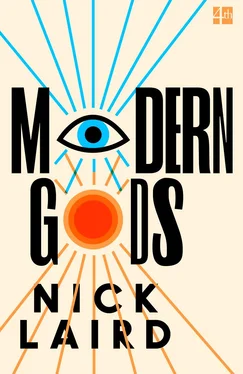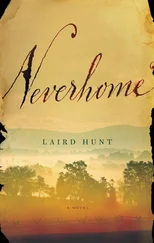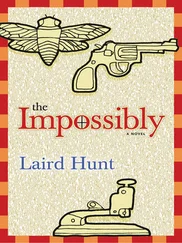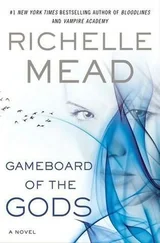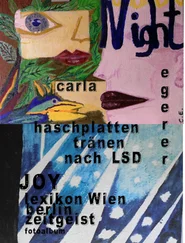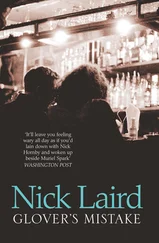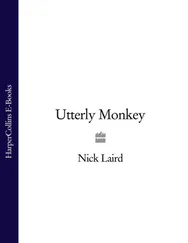Her father’s health was common ground and a safe area, but neither Stephen nor Liz could be bothered to pursue it. Kenneth himself never mentioned it, and if Liz asked him on the phone how he was doing she received a brusque, offended “Fine,” as if she’d questioned his sanity or his professional credentials.
“You want a fag?”
Obviously the answer to this query from Stephen should be no, but Liz felt that she was feeling, realistically, about as shitty as possible. Why not double down?
Home was like climbing into a suit that was made of your own body, and it looked like you, and it smelled like you, and it moved its hand when you told it to, but it wasn’t you, not now.
She flicked the finished fag out the window and closed her eyes and sleep overtook her. She woke on the dual carriageway into Ballyglass when her head bumped against the glass. There was Charlie McCord’s old petrol station, abandoned, the pumps chained and padlocked.
“Sorry I was out that whole time.”
“No bother. Good for you.”
“Did I miss anything?”
“Your wee dog snores.”
“She does, yeah.”
As they turned down Westland Road a woman in a plum-colored ski jacket and an orange bobble hat was hanging washing out on a rotary line.
“She won’t be cold.”
“She will not.”
There was a pause and Stephen felt himself about to tell Liz something but stopped. He hadn’t thought of the house for a long time—it was that rotary line that did it. A neat enough wee bungalow on a few acres, pebbledashed, brown trim, with two concrete cockerels on the gate posts he could still see raising their necks about to crow—and a rotary line in the garden. When he was a lad of ten they’d left Londonderry to move there, just outside Limavady. He’d loved that house. Surrounded by animals: doltish sheep, cows, rabbits, sticklebacks in the wee stream and birds, always birds, in the trees trilling out their notes, flittering about. The rotary was in the garden by the side of the house, where it could be seen from the road, and his mother, with that indefatigable air she had, would hoist the plastic basket of washing outside and peg up the damp things for him and his siblings, the wee socks for their wee feet. But not his father’s shirts. His father’s shirts were dried in the bathroom, over the bath, though the question of why did not even occur to him until his mother picked him up one Monday evening from Scouts in Dungiven and asked him, with a queer edge in her voice, what had happened at school today.
“Nothing, nothing really.”
They were stopped by traffic lights at the courthouse, the huge stockade of barbed wire and guard posts and searchlights.
She said, “Do you tell people what Daddy does?”
“What do you mean?”
“What he does for a living?”
“He’s a policeman.”
“He’s a policeman, yes. But when people ask you, you should say he works for the council.”
“Is Daddy OK?”
“Some bad men attacked the police station today, honey. But your daddy’s OK.”
He wanted to ask if someone was not OK, if someone would never be OK again, but he found that he couldn’t, that he was too scared to hear any more, and he sat in silence, his forehead pressed on the cold glass. Overhead there were a million stars; the dark branches of the trees sifted and released them. If there was a god, why was his purpose not to stop this?
After a few minutes, as the road unfurled under the headlights, as they sped through the fields and hedges, his mother said, “You’re a good boy, Stephen.”
Maybe everything led back to this exchange. Some small initial tilt in direction will cause, over time, a great distance to arise between the intended destination and the actual one. Certainly for days afterwards, it seemed to Stephen like someone had taken a kind of universal remote to his life and turned up the brightness and contrast, making everything sharp-edged and garish and strange. But his father was OK, until a few years later he wasn’t. Thirteen when his father was killed, shot twenty-six times by two men hiding in a ditch. There are clean deaths and messy deaths and this was the latter. Closed coffin.
The milk lorry was attempting to reverse. The sun had come out and the truck’s huge silver container tank caught the light. Stephen flicked down the visor and his license fell out, hitting the gear stick and landing in Liz’s footwell.
“Oh sorry. Here, I’ll stick it back up here.”
Liz lifted the license. The black-and-white photo showed Stephen with a side parting and a blank, slightly idiotic expression.
“You’ve a bit more hair there.”
“Aye a lot more. Here.”
He reached over sharply and lifted it out of her hands, but not before she saw his name was printed on the pink plastic card as McLean, Andrew. He slipped it back into the sun visor and flipped it up.
“Andrew?” she said involuntarily.
“Oh that. It was my father’s name, but they always called me Stephen.”
“Oh.”
Here was the sign announcing YOU ARE LEAVING COUNTY LONDONDERRY—though since a republican had blacked out the LONDON, and a loyalist had come along and erased with blue paint the DERRY, and finally some misanthrope or reasonable man at the end of his tether had whitewashed the Oand Y, and all of LEAVINGexcept for the A—the sign now cheerfully explained that:
YOU ARE A C UNT
The unofficial but more typical greeting was the next sign, which had been there as long as Liz could remember, painted in foot-high letters in a mock Gothic font on the side of the gospel hall:
The wages of sin are death: but the gift of God is eternal life.
Romans 6:23
This was a place of voices, they jostled and contested with one another—a small hard town with one long road leading to a mountain—but even now the sight of sunlight shifting on those distant slopes of bog and rock and gorse made Liz’s heart give a little shiver in her chest. They drove past the agency—Liz could see her father’s receptionist, Trish, standing behind the desk in a white blouse looking into her phone—then through Monrush, smoke rising straight up from a few chimneys on the council houses. And here another voice spoke—a new sign, roughly lettered in red, white, and blue on a sheet of plywood nailed to a telephone pole:
In Texas murder gets you the electric chair. In Magherafelt you get chair of the council.
She gestured up through the windscreen at the sign.
“What’s that about?”
“Oh, that Shinner Declan Keogh. The one who escaped from the Maze. It’s out of date now anyways.”
“How come?”
“Well, he’s now replaced wee Kieran Smith as our ‘local representative’ for Stormont. You know Kieran’s the new MP?”
“That’s right.”
Liz did not know, and when Liz did not know something she had found that “That’s right” was a usefully ambiguous formulation to reply with, particularly in the classroom. But that was in New York.
In Northern Ireland, Stephen said, “What’s right?”
“About the new MP.”
“Yeah … I just said it was. Oh they look after their own. McGuinness handed it on to Smith, and the Unionist was a fella called Barrett. Now Barrett’s father was a caretaker at Springhill. Smith was the main suspect in his killing, they say.”
“I heard that.”
There was a long pause. Stephen shifted into third. They passed the new estates—dozens and dozens of white blocky constructions littering Morgan’s Hill; they’d been erected quickly in the years of madness and entitlement when everyone could buy everything and did. The houses had something childish and optimistic about them as they strained for a little grandeur; flanking each primary-colored front door were thick fluted Doric columns.
Читать дальше
